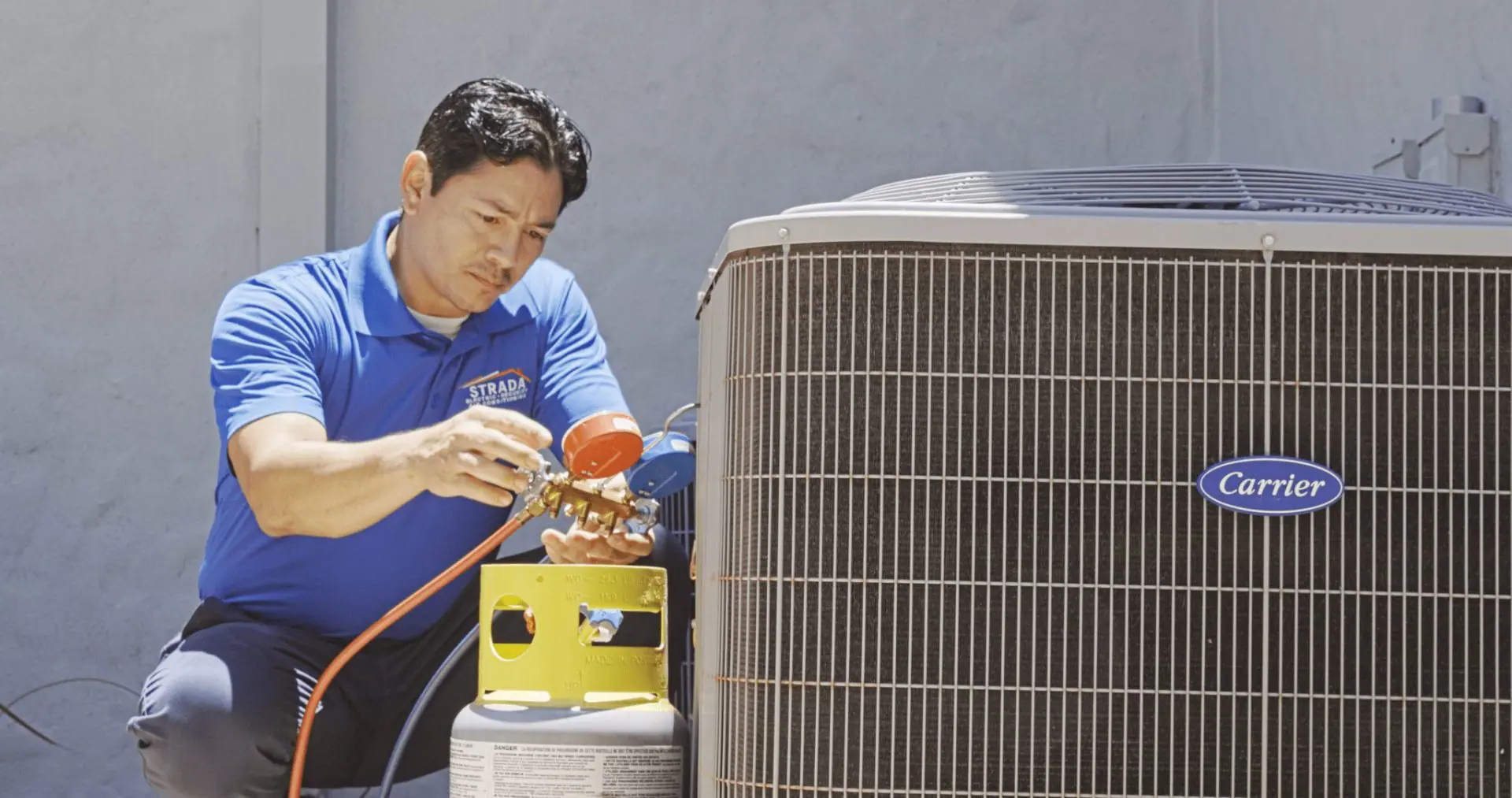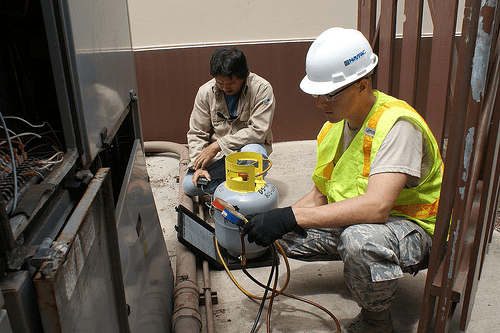The Complete Maintenance List During heat pump service
The Complete Maintenance List During heat pump service
Blog Article
Selecting In Between a Warm Pump and Heating System: Trick Factors To Consider for Your HVAC Needs
When reviewing heating alternatives for heating and cooling requires, the decision in between a heatpump and a heating system can be intricate. Each system uses unique advantages tailored to details climates and energy efficiency objectives. Comprehending these differences is important for making an educated option. Key factors such as installation expenses and environmental effect additionally make complex the option process. Which alternative absolutely lines up with one's comfort and sustainability preferences? The following areas will certainly explore these factors to consider carefully.
Understanding Warm Pumps: How They Function and Their Benefits
While numerous house owners think about various home heating options, recognizing how heat pumps feature and their benefits can substantially affect their decision. Warm pumps run by transferring warmth rather than producing it. In the winter season, they extract heat from the outside air or ground and transfer it inside, while in the summer season, they reverse this process, cooling the home by expelling warmth outside. This double capability makes them flexible for year-round environment control.One of the main advantages of warm pumps is their energy effectiveness. They make use of considerably less electrical power contrasted to standard home heating systems, possibly leading to reduced utility bills (heat pump replacement ooltewah tn). In addition, heatpump have a smaller carbon impact, making them an eco-friendly option. They also require much less upkeep than traditional systems, adding to lasting price savings. Overall, comprehending the mechanics and advantages of heatpump can aid homeowners make notified decisions concerning their heating and cooling demands
Exploring Heating Systems: Kinds, Procedure, and Benefits
Furnaces are available in various kinds, including gas, electric, and oil versions, each with distinctive functional systems. Comprehending these distinctions is vital, as they affect efficiency and home heating performance. In addition, heating systems use countless advantages, such as regular heat outcome and integrity in colder climates.
Kinds of Furnaces
Home heating systems can vary substantially in layout and operation, with furnaces being a prominent choice among property owners. There are several sorts of heating systems, each using various fuel resources and technologies. Gas heaters are common, leveraging gas to produce heat efficiently. Electric furnaces, on the various other hand, use electric resistance to produce heat, commonly favored for their straightforward installation. Oil heaters, while much less typical, are efficient in areas with minimal gas access (furnace replacement). Furthermore, condensing heaters make the most of power effectiveness by recycling and capturing exhaust gases. Each type runs with a system of heat exchangers and ductwork to disperse warm air throughout a home. Understanding the differences in between these furnace kinds is necessary for informed heating and cooling choices
Benefits of Furnaces
For property owners seeking dependable heat throughout chilly months, the benefits of heaters are significant. Heaters give regular home heating, ensuring even temperatures throughout the home. They are particularly efficient in extreme cold, frequently outperforming heat pumps in freezing problems. Various kinds, including gas, electric, and oil heaters, supply adaptability to meet varied needs and preferences.Furnaces also tend to have reduced first installation costs compared to warmth pumps, making them an extra obtainable alternative for lots of. Their robust design adds to a longer lifespan, with many units lasting over 15 years with appropriate upkeep. Additionally, modern heating systems are usually equipped with sophisticated modern technology for enhanced efficiency, which can result in reduced energy costs. On the whole, heating systems stay a trustworthy option for effective home heating.

Energy Efficiency: Contrasting Warmth Pumps and Furnaces
When contrasting power performance between heatpump and heating systems, the Seasonal Power Performance Proportion (SEER) plays a crucial role in figuring out performance. Furthermore, an operational price analysis exposes the long-term monetary effects of each system. Understanding these elements can direct home owners in making educated decisions regarding their home heating remedies.
Seasonal Energy Efficiency Ratio
Energy performance plays a crucial duty in the decision-making process between heatpump and heating systems, particularly when considering the Seasonal Energy Efficiency Proportion (SEER) This statistics measures the cooling efficiency of warmth pumps over an entire cooling season, giving a standardized way to assess performance. Higher SEER ratings show higher power effectiveness, equating to reduced energy intake and reduced energy expenses. On the other hand, heating systems are normally assessed utilizing the Annual Gas Utilization Effectiveness (AFUE) ranking, which reflects heating efficiency. When comparing these 2 systems, home owners ought to prioritize SEER ratings for heatpump, as they straight effect overall energy cost savings and environmental sustainability. A detailed understanding of SEER can notably influence the long-term contentment and cost-effectiveness of the chosen HVAC solution.
Operational Expense Evaluation
Recognizing the operational prices connected with warmth pumps and heating systems is essential for house owners assessing their options. Warmth pumps typically supply greater energy effectiveness, converting electrical energy into warmth with minimal waste. This leads to lower regular monthly utility costs, specifically in modest environments. Alternatively, typical heating systems, especially gas models, may have reduced ahead of time costs however can incur higher functional costs over time as a result of sustain prices and performance ratings.Moreover, warmth pumps can operate as both home heating and cooling systems, possibly decreasing the requirement for different cooling and heating systems. While initial investments for warmth pumps might be greater, their long-lasting savings in energy efficiency can make them an extra affordable choice for many homes. Careful analysis of local energy rates is vital to establish the most effective alternative.
Installation Costs: What to Expect for Each Heating Unit
Setup prices for heating unit can vary significantly in between warm pumps and heaters, affecting property owners' choices. Heatpump usually have higher ahead of time installment costs, commonly ranging from $3,500 to $8,000, depending on the device dimension and intricacy of installation. This includes the exterior unit, indoor handling system, and needed ductwork modifications. Conversely, furnaces have a tendency to have reduced preliminary prices, averaging between $2,500 and $6,000, which can be appealing for budget-conscious homeowners. Nevertheless, installation costs can boost if considerable ductwork is required.Moreover, the option of fuel kind for heating systems-- gas, propane, or electrical-- can likewise influence installation costs. While heatpump use energy effectiveness, their preliminary financial investment may deter some buyers. Inevitably, reviewing setup expenses alongside long-term savings and performance will certainly help property owners you can look here in making educated choices concerning their home heating systems.
Climate Considerations: Which System Performs Better in Your Location
Just how do climate problems influence the efficiency of heater? The efficiency of heatpump and heaters can vary considerably depending upon the regional climate. In modest climates, heatpump succeed by effectively moving warmth from the outdoors air, making them an energy-saving alternative. Their effectiveness reduces in very cool temperatures, where they might struggle to draw out enough heat. Alternatively, heaters, particularly gas models, give trustworthy and consistent warm no matter outdoor problems, making them more effective in chillier regions.In areas that experience milder winters, heatpump can operate successfully year-round, giving both heating and air conditioning. In comparison, regions with harsh winters commonly profit from the robustness of heaters. Ultimately, recognizing the regional climate is essential when deciding in between a warmth pump and a heater, as it straight affects their functional performance and total efficiency.
Maintenance Requirements: Long-Term Take Care Of Warmth Pumps vs. Furnaces
While both warmth pumps and heating systems need normal upkeep to ensure peak efficiency, their specific requirements and treatment routines differ considerably. Heating systems typically need much less regular attention, with annual evaluations being adequate to examine for gas leaks, tidy filters, and evaluate general capability. Their easier design commonly enables uncomplicated repairs.In contrast, heatpump require semiannual upkeep because of their twin role in cooling and heating. This consists of cleansing coils, examining refrigerant levels, and making sure that both the interior and outside systems function at their finest. In addition, warm pump maintenance usually includes even more complex components, making professional servicing essential.Neglecting upkeep can result in decreased efficiency and increased power expenses for both systems. Eventually, homeowners must consider these long-term treatment requirements when choosing in between a heat pump and a furnace, as aggressive maintenance can prolong the life expectancy and performance of either system considerably.
Ecological Impact: Choosing a Lasting Heating Choice
The ecological influence of heater is an important assessment for home owners seeking lasting alternatives. Heatpump are typically a lot more energy-efficient than conventional furnaces, as they move warmth instead than create it, considerably lowering carbon exhausts. By using renewable resource resources, such as air-source or geothermal heatpump, house owners can even more lessen their eco-friendly footprint.On the other hand, all-natural have a peek here gas heating systems send out greenhouse gases and add to air pollution, though they typically offer higher warmth output. Improvements in technology have led to the growth of high-efficiency heaters that minimize emissions.Ultimately, selecting a heating system entails weighing performance versus ecological effect. Property owners are urged to assess neighborhood energy resources and incentives for sustainable systems, ensuring an option that straightens with both individual comfort and ecological obligation. The choice influences not just prompt convenience however likewise lasting sustainability and environmental health and wellness.
Frequently Asked Questions
The Length Of Time Do Warm Pumps and Furnaces Commonly Last?
The lifespan of heatpump normally ranges from 15 to 20 years, while furnaces can last in between 15 to three decades. Normal upkeep substantially affects their durability and effectiveness in providing heating solutions.
Can I Make Use Of a Heatpump in Extremely Cold Climates?
Warm pumps can operate in extremely cold climates, yet their efficiency diminishes as temperature levels drop. In such problems, extra heating sources may be required to keep comfy indoor temperature levels and guarantee peak efficiency.

What Is the Sound Level of Warm Pumps Versus Furnaces?
The sound degrees of heatpump and heaters vary substantially. Typically, warm pumps run even more silently than typical heating systems, making them better for those delicate to seem, while heating systems may generate louder functional sounds throughout heating cycles.
Are Heat Pumps Suitable for Both Cooling And Heating?
Warmth pumps are undoubtedly appropriate for both home heating and air conditioning (heat why not look here pump installation ooltewah tn). They work by transferring warm, giving efficient temperature level control year-round, making them a versatile selection for home owners looking for an all-in-one cooling and heating solution
What Dimension Heating System Do I Required for My Home?
Determining the suitable dimension furnace for a home calls for reviewing variables such as square footage, insulation top quality, neighborhood environment, and the home's design. Consulting a specialist can assure an exact analysis and suitable convenience. Heat pumps commonly use greater power performance, converting electric energy into warmth with marginal waste. In moderate environments, heat pumps excel by successfully transferring warmth from the outdoors air, making them an energy-saving option. Alternatively, heating systems, specifically gas models, give reputable and regular heat regardless of exterior problems, making them more effective in chillier regions.In locations that experience milder winter seasons, warmth pumps can run successfully year-round, giving both home heating and cooling. Heat pumps are normally much more energy-efficient than traditional furnaces, as they transfer warm rather than generate it, considerably minimizing carbon emissions. By making use of eco-friendly power resources, such as air-source or geothermal heat pumps, property owners can better minimize their environmental footprint.On the various other hand, natural gas heaters discharge greenhouse gases and add to air contamination, though they frequently offer greater warmth result.
Report this page